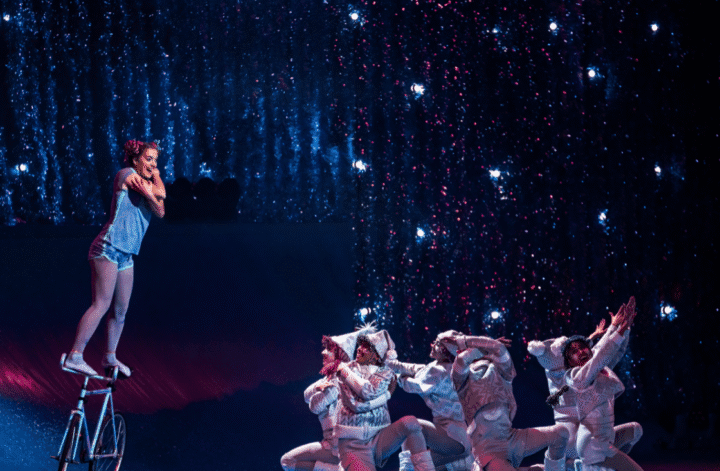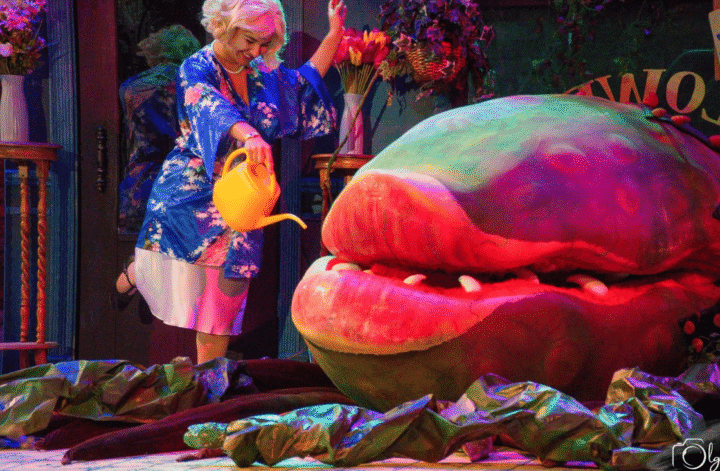What makes the difference between a monster and a man? This seems to be the primary question posed by Zoetic Stage’s production of Nick Dear’s Frankenstein, a thought-provoking adaptation of the classic novel that first premiered in 2011.
As opposed to the original book, which I, quite honestly, have only read segments and summaries of, this version of the story begins with the birth of the misbegotten “Creature” rather than that of the misguided doctor who created him.
Gabriell Salgado. Photo by Justin Namon
And while this has mixed effects on the narrative as a whole, it does provide the benefit, at least where this production is concerned, of focusing our attention on the remarkable performance of Gabriell Salgado as the monster in question.
From the moment he emerges from the womb-like structure that is the most notable element of the play’s relatively sparse set, Salgado inhabits the role completely, first with a childlike innocence as he newly orients himself towards the world. With the help of a sympathetic blind man, the Creature gradually acquires the ability to speak and some basic social graces, but his horrific appearance turns all who have sight against him.
Gabriell Salgado. Photo by Justin Namon
This monstrousness is represented visually by some rather impressionistic scarring, but his appearance is not so awful that we, the audience, are much jarred by it. Instead, what is inflicted upon us is the much subtler psychological horror of watching his pure soul poisoned by human hatred, invoking the familiar vicious cycle of man’s inhumanity to man.
Barry Tarallo, Gabriell Salgado. Photo by Justin Namon
Pitiable that his isolation thus may be in the abstract, the extreme acts of retaliation that the Creature commits early on greatly undercut any sympathy I may have had for him. Not that the titular figure, Dr. Victor Frankenstein (Daniel Capote), is so likable of a fellow either. Though the harshness with which he deals with his Creature is relatively justifiable given the danger that Creature poses, some of the cruelty with which he does so is hard to fathom, especially when it provokes the Creature to even more dastardly acts.
An eye for an eye makes the whole world blind, and bystander after bystander become casualties in the war between man and his monster, building towards a conclusion in which the play’s perhaps most sympathetic character is brutally assaulted in what is, thanks in part to some adept intimacy direction by Jeni Hacker, one of the most chilling scenes of the night. That Salgado is just as believable as he commits this violent theft of innocence as he was when he himself embodied purity is yet another testament to the actor’s extraordinary range.
The rest of the cast turned in some commendable work as well. Director Stuart Meltzer molds the entire ensemble to convey a fluidity that suits the show’s ethereal and eerie atmosphere, only enhanced by excellent lighting by Rebecca Montero and sound design by Matt Corey. In particular, Matthew Korinko delivers a few moving moments as Dr. Frankenstein’s father, Lindsey Corey, endears as his sweet but spirited fiancée, and Capote imbues the doctor himself with a notable intensity.
Lindsey Corey, Gabriell Salgado. Photo by Justin Namon
But, as I alluded to earlier, the fact that the narrative structure here positions the Creature as more of a protagonist than the doctor inflicts a kind of formlessness on the tale as a whole. A Frankenstein in which the Doctor is punished for his hubris in thinking he could play God is at least one that evokes a meaningful moral framework grounded in concepts of crime and punishment, justifying in some sense the narrative’s philosophical and psychological brutality.
Easier to swallow that story, in any case, than the story of someone who was seemingly punished just for being, born never to stand a chance. What makes the difference between a monster and a man? Could the answer be so simple as human kindness, and how much greater the tragedy if it were so?
Henry Gainza, Gabriell Salgado, Imran Hylton. Photo by Justin Namon
Fittingly, you have until this Halloween (Oct 31) to catch this spooky show on Thursdays through Sundays at Miami’s Adrienne Arsht Center. But, if, after the horror of, you know, the past year and a half, you’re in the mood for a somewhat more hopeful piece of theatre as your entry point to the 2021 season, another excellent show that you could check out is Slow Burn Theatre’s Songs For A New World, which will be running one more week at Fort Lauderdale’s Broward Center with performances from the 19th until the 24th.
Timothy Michael Quinn, Heather Jane Rolff, Darius J Manuel, Cecilia Snow. Photo by Gregory Reed
This staging of the 26 year old show actually began with an overt nod to the pandemic, and some of the long-ago written lyrics could have hardly been more appropriate to usher us into the brave new world of post-pandemic theatre.
“A new world calls across the ocean
A new world calls across the sky
A new world whispers in the shadows:
“Time to fly, time to fly…”
In actuality, this opening number was written to convey the unifying idea of the seemingly unrelated eighteen songs that will follow, which is the fact that they all take place at a character’s pivotal “moment of decision.” The result is thus a thematically linked “song cycle” rather than a plotted musical proper, but one in which the show’s four “characters” do progress through impressionistic arcs despite the fact that they do not play the same literal person throughout.
For example, we watch Woman 2 (Heather Jane Rolff) transition from a shallow and suicidal trophy wife into one philosophically contemplating her life choices and then finally to a mature maternal figure, while Man 1’s (Darius J. Manuel) ambitions to make a difference are first playful, then thwarted, then realized in a bittersweet conclusion.
Meanwhile, Man 2 (Timothy Michael Quinn) and Woman 1 (Cecilia Snow) deliver respective ballads about their troubled relationships throughout the show but end up committing to each other wholeheartedly in the duet “I’d Give It All For You,” one of many achingly earnest arrangements.
Heather Jane Rolff. Photo by Gregory Reed
As opposed to Frankenstein’s cynical Halloween vibes, this show seems as if it might’ve been more appropriate for the Christmas season, with one comedic number delivered by a resentful Mrs. Claus and another called “Christmas Lullaby” that makes repeated reference to Mother Mary and somehow managed to tug at the heartstrings of even this atheist.
But the song’s redemptive spirit also fit well for the current moment, one that comes at the end of a time that has proven transformative for many of us. Along with being refreshing in that I could give a much-needed break to my attention span, the show’s patchwork format made the characters uniquely relatable as they seemed to be blank slates besides their present plights, allowing us to fill in the gaps with moments that we ourselves were stuck standing at crossroads.
This quality takes on an inspirational tint given the show’s recurring theme of conquering fear, whether doing so meant leaving a lover or committing to one, sailing across the ocean or surrendering to single motherhood, fighting in a war or sewing flags to grace its battlefields.
The cast not only delivers powerhouse vocals throughout but are more than up to the challenge of acting their way through their characters’ pivotal moments, to the extent that it feels impossible to name a standout. The show’s closing number also gives a nod to the power of music and indeed all art as its characters offer a sort of prayer:
“Hear my song
It’ll help us get through ’til tomorrow
Hear my song
It’ll help us survive all the pain”
And now that I think of it, Frankenstein did, yes, end with a song as well, a haunting rendition of the psalm “De Profundis,” a desperate plea for redemption from a seemingly absent God that was perhaps its own incarnation of hope for a “new world” in the wake of unfathomable tragedy.
As far as the logistical necessities of theatre-making in the pandemic age, I’m also happy to report that both productions required a recent negative test or proof of vaccination for entry, as well as, masking throughout the show. Would only the rest of civilization be as sensible as us theatre people!
Cecilia Snow. Photo by Gregory Reed


